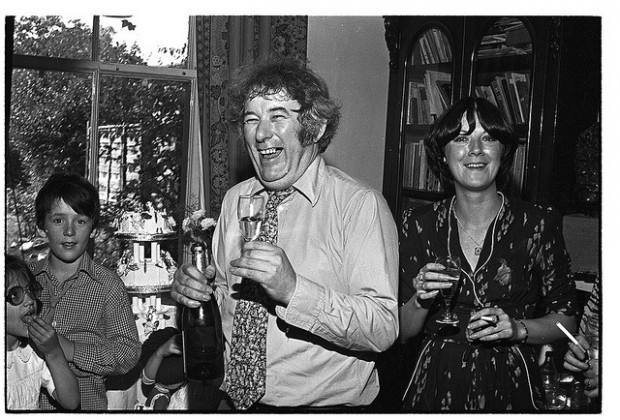
Seamus Heaney with his family and at a party at home in Dublin, 1979. Photographer: Bobbie Hanvey
It’s the 17th annual World Poetry Day, which was first declared by Unesco in 1999 to help meet the world’s aesthetic needs by promoting the reading, writing and teaching of poetry. This year, Unesco director-general Irina Bokova said: “By paying tribute to the men and women whose only instrument is free speech, who imagine and act, Unesco recognises in poetry its value as a symbol of the human spirit’s creativity. […] The voices that carry poetry help to promote linguistic diversity and freedom of expression.”
One poet of this calibre was Seamus Heaney.
The Irish poet, playwright and lecturer was as prolific a translator of poetry as he was a writer. In September 1998, his translation of Gile na Gile, a poem written by Irish language poet Aodhagán Ó Rathaille (1670–1726) was published exclusively in Index on Censorship under the title The Glamoured.
“It is a classic example of a genre known as the aisling (pronounced ashling) which was as characteristic of Irish language poetry in the late seventeenth and eighteenth centuries as rhymed satire was in England at the same time,” Heaney wrote in Index. “The aisling was in effect a mixture of samizdat and allegory, a form which mixed political message with passionate vision.”
This month, Heaney, who died in August 2013, offers us a gift from the afterlife: the publication of his translation of Aeneid’s Book VI, the Roman poet Virgil’s epic on mythic Trojan Aeneas’s journey to Hades. In the poem, Sibyl of Cumae, a guide to the underworld, “chanted menacing riddles” in an attempt to confuse our hero:
Then as her fit passed away and her raving went quiet,
Heroic Aeneas began: ‘No ordeal, O Sibyl, no new
Test can dismay me, for I have foreseen
And foresuffered all. But one thing I pray for
Especially: since here the gate opens, they say,
To the King of the Underworld’s realms, and here
In these shadowy marshes the Acheron floods
To the surface, vouchsafe me one look,
One face-to-face meeting with my dear father.
In the introduction to Aeneid’s Book VI, published posthumously, Heaney describes the poem – which he began working on in 1986 after the death of his father – as “like classics homework, the result of a lifelong desire to honour the memory of my Latin teacher at St Columb’s College, Father Michael McGlinchey”.
St Columb’s is a Roman Catholic grammar school for boys in Derry. Heaney formed part of the school’s “golden generation” in the 1940s and 1950s, which included the dramatist Brian Friel and politician John Hume.
When I attended St Columb’s between 1999 and 2006, pupils were reminded of the school’s alumni illustrissimi — especially Nobel laureates Heaney and Hume — at many a class, assembly and function. One of the highlights of my time as a pupil was attending an after-school discussion with Heaney and the classicist Peter Jones. They spoke of the positive effect reading poetry has on thought processes and the irrelevancy of the poet’s intention when a reader encounters the poem. It is, he said, our own unique experience with a work that truly matters.
Afterward, Heaney signed my copy of Redress of Poetry, a collection 10 lectures he gave between 1989 and 1994 while a professor of poetry at Oxford.
“Poetry cannot afford to lose its fundamentally self-delighting inventiveness, its joy at being a process of language as well as a representation of things in the world,” Heaney writes in the opening chapter. “[P]oetry is understandably pressed to give voice to much that has hitherto been denied expression in the ethnic, social, sexual and political life.”
Redress of Poetry’s predecessor, the collection of literary criticism essays from 1978-1987 titled Government of the Tongue, discusses in much more depth those who have been denied such expression in their political and social lives. The book is perhaps best known for its celebration of poets of the Eastern Bloc, the former communist states of central and eastern Europe. The discovery of poets such as Czesław Miłosz, Osip Mandelstam, Joseph Brodsky and Zbigniew Herbert had an impact on Heaney’s own work. As a Northern Irish Catholic, Heaney could easily identify with the religion, culture and history of Polish poets Miłosz, whose work was banned by Poland’s communist government, and Herbert, who organised protests against censorship in the Eastern Bloc.
One poem Heaney references is Miłosz’s Child of Europe, which reads:
We, from the fiery furnaces, from behind barbed wires
On which the winds of endless autumns howled,
We, who remember battles where the wounded air roared in
paroxysms of pain.
We, saved by our own cunning and knowledge.
It brings to mind the experiences of many in Northern Ireland. Throughout the Troubles, Heaney was known for expressing both clarity and humanity amid chaos. He tells a story in Government of the Tongue, however, of his personal difficulties in creating art amid violence. He was on his way to a recording session at the BBC studios in Belfast sometime in 1972 with folksinger David Hammond when the pair heard bombs go off.
“[T]he very notion of beginning to sing at the moment when others were beginning to suffer seemed like an offence against their suffering,” he wrote.
This tension in the poet’s mind seemingly had no bearing on his ability to capture the mood of an entire nation through his work. In The Cure at Troy, Heaney’s telling of Sophocles’ Philoctetes, the story of how Odysseus tricked Achilles’ son into joining the Greek forces at Troy, expressed the hope felt by many in his country in 1991, a year of ceasefires and all-party talks.
The poem contains the often-quoted and poignant words:
History says, don’t hope
On this side of the grave.
But then, once in a lifetime
The longed-for tidal wave
Of justice can rise up,
And hope and history rhyme




